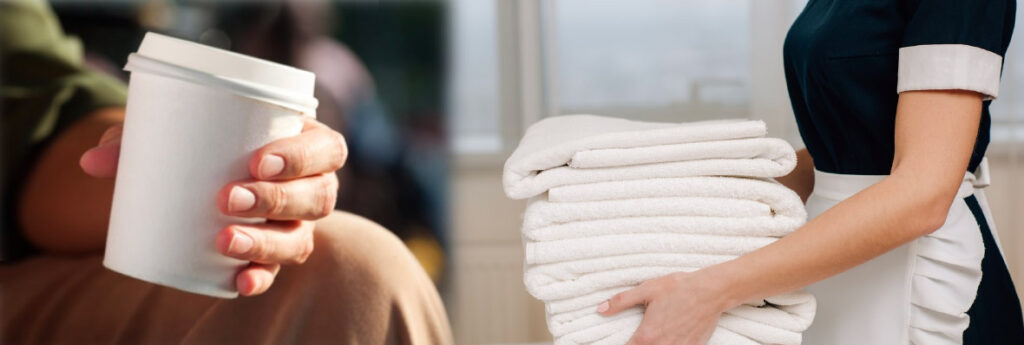For many of us, supply chain issues mean the grocery store is perhaps out of Bran Flakes, and we’re forced to choose Cheerios instead. For hotels — an industry already hit hard by the COVID-19 pandemic — supply chain issues are causing even bigger problems.
Vimal Patel knows this all too well. The CEO of QHotels Management, which operates franchises of hotel brands, including some Hampton Inn, Holiday Inn and Best Western properties, says lately he’s scrambling to find towels, shampoos, notepads, and other supplies his hotels run through (and run out of) due to supply chain problems.
“Ever since the pandemic, serving paper products like plates and napkins, as well as food itself, has become a huge problem – and a customer service challenge,” he says. “Guests often don’t understand why a product is unavailable.”
Things got heated at one of his hotels, which advertises 12-ounce cups of coffee.
“We could only find 8-ounce cups, and we couldn’t find any lids,” Patel says. “We had to use a substandard cup, because that’s all we could get. That was deeply upsetting to some customers.”
For weary travellers seeking to caffeinate, lidless coffee might feel like a reason to leave a one-star review, especially for unpracticed travellers who might not be accustomed to the myriad COVID-related travel changes. But here’s why there’s no point in crying over spilled milk:
Deliveries unpredictable
Most of Patel’s properties are franchises of larger brands and require conforming to brand standards. Patel typically orders items from an approved vendor, which previously took about 48 hours to arrive. “Now, it can take months,” he says. “You’re lucky to get it within three weeks.”
Towels are typically reordered every other month, as they get discoloured after enough use (and some just disappear). Yet, bulky items like these are tough to stockpile, since most hotels have limited storage space.
“We’ll have a family of four use all the towels in the morning, and then ask for a second set in the evening,” he says. “Sometimes we just don’t have enough.”
Amid the coffee cup shortage, Patel had to send an employee to Costco to buy whatever cups they could find. “With basic necessities, it’s hard to tell a customer, ‘We don’t have that,’ so sometimes you just have to make it work,” he says.
Higher costs
Most industries are witnessing inflation — and hotels are no different. Hotels reported a 79% cost increase on day-to-day cleaning and housekeeping supplies, a 77% increase for linens and other soft goods, and a 77% increase in food and beverage supplies, according to a November 2021 survey of about 500 hotel operators conducted by the American Hotel & Lodging Association.
Staffing issues
In a separate AHLA survey from October 2021, 94% of respondents said their hotels are understaffed (including 47% who say they are severely understaffed). Additionally, 96% of hotel operators said they are trying to hire, yet are struggling to fill open positions. And for an already overworked hotel employee, dealing with a customer upset about their undersize coffee cup can be extra challenging.
Construction problems
The coffee chaos was small beans for Patel’s business, which operates in Louisiana. Nearly half of his properties are closed due to flooding and roof damage in the aftermath of Hurricane Ida. He says local home improvement stores are out of materials, and construction workers are tough to hire.
While the hurricane brought extra challenges for Louisiana businesses, hotels across the continent are experiencing construction-related issues. In the first year of the pandemic, many hotels put off planned renovations.
Now, it might be too late to renovate without going over budget. Construction material costs jumped nearly 20% in 2021, according to an analysis by the Associated General Contractors of America. In a separate AGC survey from winter 2021, 90% of contractors attributed such issues to the supply chain, and 72% said projects take longer than anticipated because of COVID-19.
What to expect during your next hotel stay
Travellers are returning, but labour and materials still haven’t – and the outlook isn’t exactly promising. Of the AHLA survey respondents, 36% said they expect supply chain disruptions to last at least another year.
For travellers, that means anticipated renovations might not have even started. It means guests might not have the exact amenities they’re used to – and that sometimes, the amenities anticipated will not be available, period.
Patel says he hopes customers will understand the challenges that the hotel industry faces. “We’re not cutting corners because we’re trying to nickel and dime,” he says. “It’s simply the situation we’re in.”
And just as a hotel likely wants you to feel like you’re at home, Patel says he hopes people realize the supply chain shortages felt at home are hitting his industry too.
“Whether it’s finding groceries or a roof for your own home – they’re the same challenges that businesses are facing, but 10 times,” he says.

